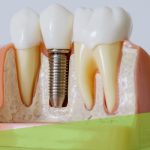Dental Implants: Is There an Age Limit for Getting Them?
Dental implants are a prominent and effective way to replace missing teeth. They are constructed to look, feel, and function like your natural teeth. However, many people wonder if there is an age limit for getting these fixtures. Luckily, this article will summarize dental fixtures and the age-related issues that come with them.
Is There Such a Thing as “Too Young for Implants”?
With dental care for children, it is important to consider the long-term health and aesthetic benefits of investing in dental fixtures. While it may be tempting to have your child’s teeth corrected with dental fixtures at a young age, dental fixtures are generally not recommended for children.
One of the main risks of dental fixtures in children is that their teeth are still developing. The fixtures may become loose or even move as the teeth grow and develop. Additionally, the jawbones and gums of children are still developing, which can make it difficult to adjust the fixtures to fit properly. It’s best to wait until the permanent teeth are in place and the jawbone is fully developed before considering implants.
The Earliest Age for Implants
If you want dental implants as early as possible, the best age would be around 16 to 18. This is because the jawbone has reached its full maturity by this age and is more stable, making it easier to fit and adjust the implants. Additionally, the wisdom teeth have usually grown in by this age, so there is less risk of the implants shifting or becoming loose due to the changing teeth structure.
However, you must realize that even at this age, the implants are still at risk of becoming loose or shifting because of the changing bone structure. For this reason, it’s important to consult a dentist to ensure that the implants fit your child’s needs.
Age-Related Issues That Can Affect the Implants
Although it’s mentioned above that the best age for implants is around 16 to 18 years old, some instances rule out your candidacy for implants, such as:
- Missing Teeth: Some patients tend to miss teeth at this age, which can cause difficulty in the implant process.
- Bone Density: Implants need to be placed in an area with enough bone density to support the implant. If your jawbone is not dense enough, it may be difficult to place the implant.
- Inadequate Oral Hygiene: Poor oral hygiene can increase bacteria, plaque, and tartar, leading to implant failure.
- Overall Health. Your overall health can also play a role in your candidacy for implants. If you have a chronic health disease that may affect your ability to heal, this could be a consideration in whether or not you are a suitable candidate for implants.
- Medications. Certain medications can interfere with the implant process, so discussing any medications you take with the dentist before the procedure is important.
Dental implants are a viable option for individuals of any age. While there is no hard age limit for getting implants, discuss the decision to get them with a dentist who can assess your suitability for getting implants.
Aside from that, the implant’s success depends on the patient’s commitment to maintaining good oral hygiene. Ultimately, it is up to the patient and their dentist to decide whether implants are the best way to restore a patient’s smile.
Brush Dental provides cost-efficient and high-quality dental implants in Seattle, Washington, to help patients restore their smiles, their confidence, and improve their oral health. Schedule an appointment with us today!







